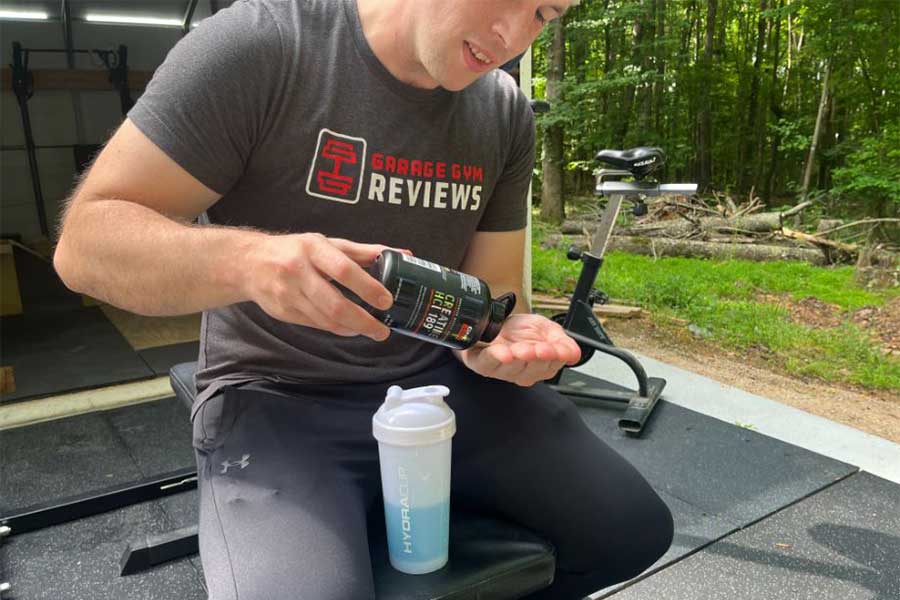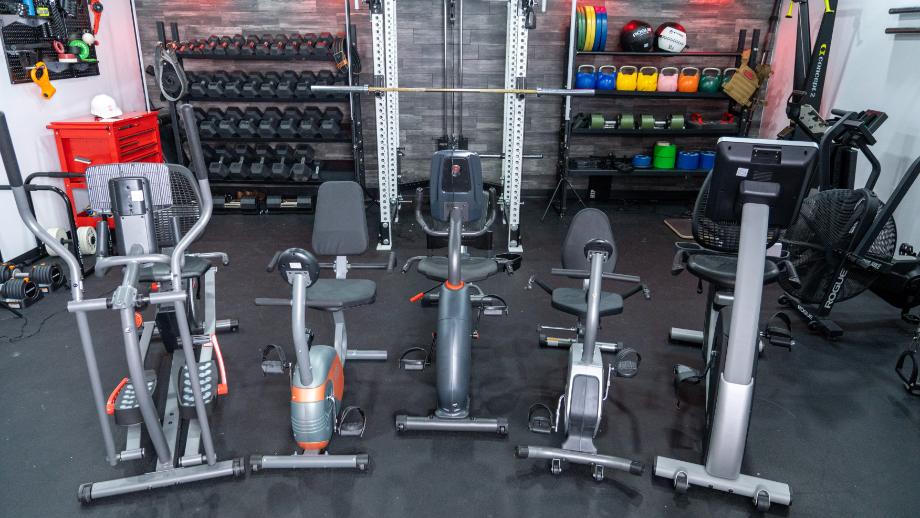I’ve competed in weightlifting for over two decades, and in that time I’ve run the full gamut of focusing on my nutrition, from being a supplement nerd and health and wellness nut, all the way to forgetting to take my protein powder out of the pantry for years at a time (apologies to my coach).
No matter how close or far-removed I am from my nutrition, however, one supplement I always focus on is creatine. As one of the most researched supplements out there, the best creatine is great for athletic performance and building muscle mass and strength—ideal qualities to have for a competitive weightlifter.
Still, while we know creatine is a rather safe supplement, there are some side effects that you may want to avoid. For example, does creatine make you bloated? I talked with USA Weightlifting’s Meagan O’Connor, RD, about the possible side effects of creatine, and possible ways to avoid those less-than-desirable effects from the supplement. Read on to learn how creatine can affect you—bloating, weight gain, and otherwise—and how to mitigate those risks.
Medical disclaimer: This article is intended for educational and informational purposes only. It is not intended as a substitute for medical advice. For health advice, contact a licensed healthcare provider.
What Is Creatine?
Creatine1 is a naturally occurring amino acid produced in the liver, kidneys, and pancreas, and then stored in muscle tissue and the brain as creatine phosphate (or phosphocreatine). Its main role is to help replenish adenosine triphosphate (ATP). ATP is your body’s energy source for muscular contractions and dynamic movements like sprinting or resistance training.
As a supplement, creatine is the most researched supplement2 on the market. There are different types of creatine, including creatine HCl and creatine citrate, but the best supplement and most heavily researched form of creatine is creatine monohydrate. Creatine comes as its own supplement, but can also be added to pre-workouts and BCAA supplements.
RELATED: Creatine HCl Vs Creatine Monohydrate
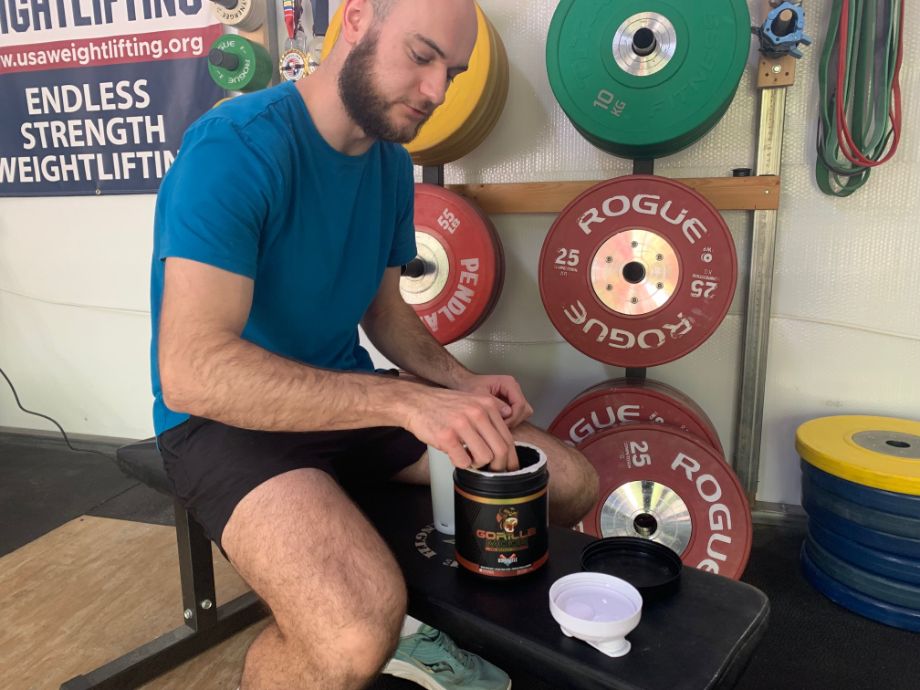
There are quite a few potential benefits of creatine, but the most popular benefits with gym-goers and bodybuilders are improved athletic performance, muscle recovery, and building muscle mass.
- Increased Performance: In a 2018 study3, athletes were shown to improve their maximal strength levels through strength training and creatine supplementation in as little as four weeks.
- Muscle Recovery: Creatine can be a muscle recovery supplement, as well. In a June 2021 review4, creatine was shown to help mitigate muscle damage and restore lost power potential faster after high-intensity training, which could possibly help in better and faster muscle recovery overall.
- Lean Muscle Mass: In a 2022 review2 of a decade of clinical trials and studies, it was remarked that groups who supplemented with creatine always had a greater increase in lean muscle mass than those given a placebo.
Creatine Bloating and Weight Gain
Supplementing with creatine can cause what is known as “creatine bloating” and weight gain, although maybe not in the typical way you may think of bloating. Meagan says creatine can cause initial weight gain due to creatine drawing water into the muscle cells. This extra water retention can cause a slight weight gain at the initial supplementation of creatine. Although it may give you a bloated feeling, it’d just be water weight.
The International Society of Sports Nutrition5 claims that weight gain is the only consistent side effect from creatine. If your goal is to gain muscle or strength, then this probably isn’t a bad thing; however, for competitors in weight-class sports or for those with weight loss goals, this might be a nerve-wracking concept.
RELATED: Does Creatine Make You Gain Weight?
While water retention is always a possibility while using creatine, Meagan emphasizes it’s a more likely risk with larger doses of creatine. These high doses come from a creatine loading phase, where the goal is to saturate the muscle cells with creatine to more quickly reap the benefits of the supplement.
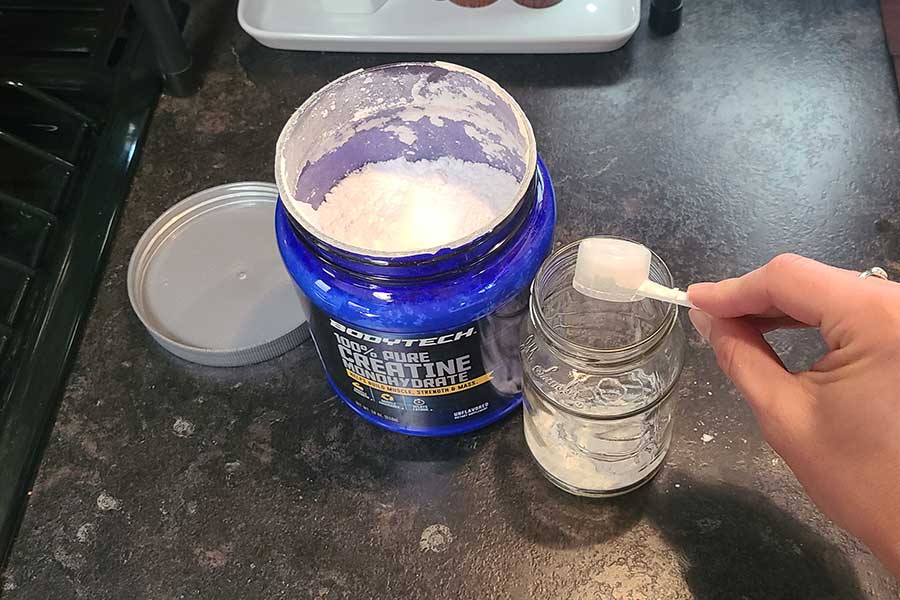
Meagan says the risk of creatine bloating and other side effects is more likely during the loading phase. She adds, “Honestly, there’s mixed research on the necessity of a loading phase, since it can take a while for your body to accrue and benefit from creatine supplementation…it’s not an instant effect like caffeine.”
Because there’s no consensus to the efficacy of a loading phase, if you’re worried about the initial water weight, Meagan suggests that you start your creatine intake with a maintenance dose of 3 to 5 grams of creatine a day. At worst, it’ll take a bit longer to achieve full saturation of the muscle cells, but it’ll minimize your risk for water retention, weight gain, and other possible side effects from the dietary supplement.
While creatine actually increases your body water levels, Meagan still emphasizes the importance of keeping your hydration levels up, and making sure you’re drinking enough water to get the most out of your supplementation, strength workouts, and high-intensity exercise.
Other Side Effects of Creatine
Although weight gain and water retention are the most commonly discussed creatine side effects, there are other side effects worth noting.
Digestive Issues
The other major side effect of creatine is gastrointestinal distress and stomach issues. This can cause less desirable effects like bloating, gas, stomach pains, or diarrhea. Just like water retention, though, the risk of this side effect is greatly increased by taking a large amount of creatine all at once.
One study from 20086 tracked athletes supplementing with different levels of creatine. Those who took 10 grams of creatine at once experienced diarrhea and other gastrointestinal issues more often than those who broke up their creatine intake into 5-gram doses. Again, to reduce your chances of stomach issues, it may be wise to avoid an initial loading phase.
Muscle Cramping
Another common side effect that has been reported from creatine supplementation is muscle cramping. However, cramps can be another indicator of over-supplementing creatine.
One study7 of collegiate football and baseball players showed that out of the athletes reporting muscle cramping, an overwhelming 91% of athletes were over-supplementing creatine. Another study8 of football players gave the athletes a proper daily creatine dose, and muscle cramping incidents were no higher than during a normal football season.
Kidney Damage
The concern of kidney damage from creatine intake stems back to 1998, according to the Journal of the International Society of Sports Nutrition9. This fear still persists due to a lack of understanding of how creatine works and metabolizes in the body. However, over the last 25 years and longer, the journal states that no research has shown that recommended doses of creatine pose any risk to kidney function or renal health.
Overall, creatine side effects mostly cause discomfort or weight gain and the risks of those effects can be minimized or mitigated with sticking to the recommended maintenance dose.
The Loading Phase vs the Maintenance Dose
The common recommendation for daily creatine intake is 3 to 5 grams of creatine, according to a 2021 review from the Journal of the International Society of Sports Nutrition9. This range is known as the maintenance dose and is the minimum dose to get the benefits of creatine, including building muscle and improving athletic performance. This recommended dose should result in complete saturation of the skeletal muscle in a few weeks time.
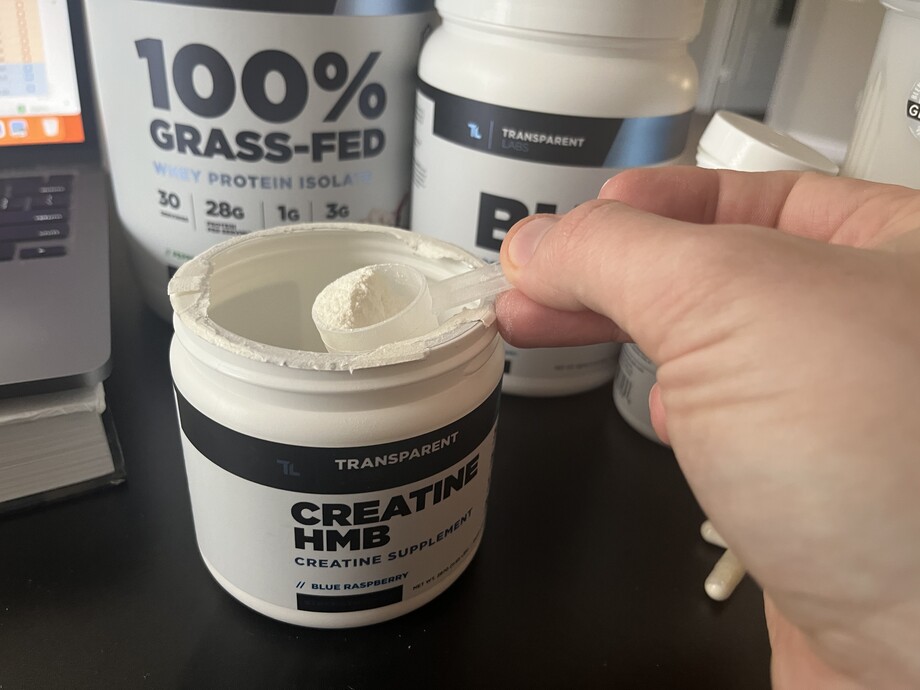
A creatine loading phase is performed to attempt to saturate the muscles faster, by increasing your creatine intake to multiple times per day. According to the International Society of Sports Nutrition9, a typical loading phase dose is 20 to 25 grams per day, split up in four or five doses. Athletes will do this for 5 to 7 days.
The loading phase is not necessary, although it may take longer for a person to reap the full benefits from their creatine supplementation without it. Additionally, if you’re prone to bloating and stomach issues, Meagan recommends skipping the loading phase and going straight to the lower maintenance dose.
Does Creatine Make You Bloated? Final Thoughts
Creatine is a highly researched supplement and many of its positives and negatives are known. It’s a great supplement for building muscle, athletic performance, and muscle recovery, and studies have shown no negative effects on major organs in the body from creatine supplementation.
Still, there are a few side effects that are less desirable. Creatine can cause water retention and weight gain initially, as well as digestive distress, which may lead to bloating. You can minimize your risk for adverse side effects in your creatine supplementation with these tips:
- Do not take more than the recommended maintenance dose of 3 to 5 grams of creatine daily.
- If you’re prone to stomach issues, or worried about excessive water retention, you may want to skip any creatine loading phase.
- If you do a creatine loading phase, space out your creatine doses so that you’re not taking more than 5 grams in one sitting.
Keeping your creatine intake within the maintenance dosage daily will greatly reduce your chances of bloating and weight gain from water retention.
Does Creatine Make You Bloated? Q&A
How does creatine make you bloated?
Creatine draws water to muscle cells, which can cause water retention in the muscles, making you feel bloated in the muscles; this is often referred to as “creatine bloating.” This water retention tends to be a short-term issue, only affecting people when they first start taking creatine.
Creatine can also cause digestive issues for some people, leading to bloating and stomach pain. Keeping your dose to 3 to 5 grams daily will reduce your risk of water retention and digestive issues greatly.
Does creatine bloating go away?
Yes, it can. Typically a product of a creatine loading phase, most water retention will go away once you switch to a maintenance dose of 3 to 5 grams of creatine per day.
What are the side effects of creatine?
Creatine can cause weight gain initially, from water retention in the muscle cells. Additionally, creatine can cause gastrointestinal issues like stomach pain and bloating. If you’re prone to stomach issues, keep your creatine intake at the maintenance level of 3 to 5 grams per day.
These statements have not been evaluated by the Food and Drug Administration. This product is not intended to diagnose, treat, cure, or prevent any diseases.
References
- Creatine. Mayo Clinic. Feb 9, 2021.
- Wu SH, Chen KL, Hsu C, Chen HC, Chen JY, Yu SY, Shiu YJ. Creatine Supplementation for Muscle Growth: A Scoping Review of Randomized Clinical Trials from 2012 to 2021. Nutrients. 2022 Mar 16;14(6):1255. doi: 10.3390/nu14061255. PMID: 35334912; PMCID: PMC8949037.
- Wang CC, Fang CC, Lee YH, Yang MT, Chan KH. Effects of 4-Week Creatine Supplementation Combined with Complex Training on Muscle Damage and Sport Performance. Nutrients. 2018 Nov 2;10(11):1640. doi: 10.3390/nu10111640. PMID: 30400221; PMCID: PMC6265971.
- Wax B, Kerksick CM, Jagim AR, Mayo JJ, Lyons BC, Kreider RB. Creatine for Exercise and Sports Performance, with Recovery Considerations for Healthy Populations. Nutrients. 2021 Jun 2;13(6):1915. doi: 10.3390/nu13061915. PMID: 34199588; PMCID: PMC8228369.
- Kreider RB, Kalman DS, Antonio J, Ziegenfuss TN, Wildman R, Collins R, Candow DG, Kleiner SM, Almada AL, Lopez HL. International Society of Sports Nutrition position stand: safety and efficacy of creatine supplementation in exercise, sport, and medicine. J Int Soc Sports Nutr. 2017 Jun 13;14:18. doi: 10.1186/s12970-017-0173-z. PMID: 28615996; PMCID: PMC5469049.
- Ostojic SM, Ahmetovic Z. Gastrointestinal distress after creatine supplementation in athletes: are side effects dose dependent? Res Sports Med. 2008;16(1):15-22. doi: 10.1080/15438620701693280. PMID: 18373286.
- Greenwood M, Farris J, Kreider R, Greenwood L, Byars A. Creatine supplementation patterns and perceived effects in select division I collegiate athletes. Clin J Sport Med. 2000 Jul;10(3):191-4. doi: 10.1097/00042752-200007000-00007. PMID: 10959929.
- Greenwood M, Kreider RB, Melton C, Rasmussen C, Lancaster S, Cantler E, Milnor P, Almada A. Creatine supplementation during college football training does not increase the incidence of cramping or injury. Mol Cell Biochem. 2003 Feb;244(1-2):83-8. PMID: 12701814.
- Antonio, J., Candow, D.G., Forbes, S.C. et al. Common questions and misconceptions about creatine supplementation: what does the scientific evidence really show?. J Int Soc Sports Nutr 18, 13 (2021). https://doi.org/10.1186/s12970-021-00412-w


